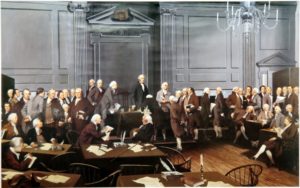The (Ab)Uses of History
As we enter the presidential campaign season, pity the Founding Fathers. Among the recent incantations of the Founding Fathers by Republican hopefuls, we find:
- Mitt Romney, with characteristic vagueness, launched his campaign by “hailing” the Founding Fathers (attaboy, fathers!).
- Michelle Bachmann was delighted to proclaim that the Founding Fathers ended slavery (boy, is Abe Lincoln going to be upset to hear about this).
- Newt Gingrich was proud that the Founding Fathers would have opposed having a Federal Reserve Bank as much as he does.
- Rick Santorum promised to return us to the original intention of the Founding Fathers that there be no separation of church and state.
- Even though he has not yet announced his candidacy, who can resist Texas Gov. Rick Perry’s insistence that the FFs would be appalled by embryonic stem cell research?
Delegates to the Constitutional Convention opposing separation of church and state, embryonic stem cell research, and the Federal Reserve Bank; also ending slavery
My point is not that these candidates are appalling in their historical and constitutional ignorance. Well, that’s not my only point. (Can someone explain what it means for Michelle Bachmann to claim to be a “constitutional conservative“? Are the others unconstitutional? Did she learn that from the Founding Fathers?)
My point is that the secular religion of the Founding has become ever more appalling. I have somewhat mixed feelings about this. I like people to study the Founding, preferably by reading The Summer of 1787, or even my forthcoming book on Aaron Burr, the Bad Boy of the Founding. (They’re best in hardcover!)
But where do our politicians get the need to recite the Founding Fathers every time they open their mouths? As luck would have it, I recently came upon a thoughtful treatment of this question from 1955. C. Vann Woodward was a terrific historian who observed Way Back Then that Americans have “expected too much of history. They have made too many demands upon it and put it to too many questionable uses.” Indeed, he thought Americans had “made more exorbitant demands upon history than have other peoples.”
The reasons for these exorbitant demands? Prof. Woodward pointed to our immigrant character. For Americans, our limited history has to provide “the folk-lore, myth, and legend that seems essential to the spiritual comfort of a people in time of stress.” The English have King Arthur, or the nobles at Runnymede framing the Magna Carta, or the Druids painting themselves blue and driving the Romans batty.
By coming to America, we had to give up the myths and traditions of the old country. At least, we give them up after two or three generations. What we are left with is the Founding, and it has to answer a lot of problems.
Americans’ obsession with their history puzzles people many in the rest of the world, in part because we have so little of it. Andrzej Paczkowski (it’s pronounced the usual way) is a Polish historian I met a few years back. He was dumbfounded by American historical sites. “If George Washington spat somewhere,” he said, “you have a plaque describing it. In Poland, we have battlefields where hundreds of thousands of soldiers fought and have no marker at all.” There was, I also note, a trace of envy in his voice.
Professor Woodward’s essay explored the dark side of our obsession with history. He quoted from George Orwell’s 1984, the basic text of the dystopian view of history (pretty good for a book about the future). Orwell created a powerful party slogan for his 1984 world: “Who controls the past controls the future; who controls the present controls the past.”
Egad. If Orwell was right — and that slogan has a good bit of force — maybe these presidential candidates are onto something.
But, please, spare me Sarah Palin as an interpreter of our history. Paul Revere was not riding to every Middlesex village and farm, in the middle of the night, to warn the British. The British were back in Boston. If he wanted to warn them, all he had to do was walk over to their headquarters.
But Ms. Palin’s spring tour of the shrines of American history reflected her savvy appreciation of what matters to Americans. I just wish she would read more.
